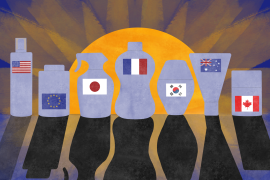Also In Global Health News: Poverty In India; Measles Outbreak In Zimbabwe; Malaria Drugs In Uganda; Zambia’s Cholera Outbreak; Proposed British Foreign Aid Law
More Than 410M People Living In Poverty In India, Estimates Show
Estimates released on Sunday show there are more than 410 million people living on less than $1.25 per day in India "100 million more people living below the poverty line than in 2004," Reuters reports (Majumdar/Neogy, 4/18). The estimates come as the government works to draft legislation aimed at ensuring food security for the poor in India, Bloomberg/BusinessWeek adds. "Prime Minister Manmohan Singh, whose vow to reduce poverty helped him win a second term in May 2009, is planning to introduce a bill that would guarantee at least 25 kilograms (55 pounds) of rice or wheat a month to poor families at 3 rupees (6 U.S. cents) a kilogram," the news service writes (Dhara, 4/19). Also reporting on the estimates, the Wall Street Journal examines advocates' reactions to the updated number of people in need of assistance in India and the problems the country's current food has faced (Sharma, 4/18).
WHO, Zimbabwe Ministry Of Health Report Documents Movement Of Measles Outbreak In Country
A joint report released last week by the WHO and the Zimbabwe Ministry of Health documents the spread of a "measles outbreak first announced last September to 48 districts in the country," ZimOnline reports. According to the report, "so far more than 200 people have died with most of the cases among members of religious groups that shunned conventional medical treatment," the newspaper writes (4/16). "[A] total of 3,285 suspected measles cases have been recorded as of March 28," the Herald/allAfrica.com adds. "Of the reported cases, only 301 had proof of previous vaccination," the news service adds (4/16).
Uganda Signs MoU For Malaria Drugs As Part Of Global Fund Grant
As part of a $24 million Global Fund to Fight AIDS, Tuberculosis and Malaria grant for the purchase of malaria drugs, Uganda's "Ministry of Health signed a memorandum of understanding (MoU) with two pharmaceutical companies, Ajanta Pharma and Abacus (Africa) Limited" to supply anti-malarials, the Daily Monitor reports. According to the newspaper, the Global Fund "money will be used to purchase drugs like Artemisinin-based combination therapies (ACTs) such as Coartem, Artemether and Quinine injections and Quinine tablets" (Lirri, 4/16).
Health Workers Say Zambia Facing 'Worst Cholera Outbreak In Years'
"Health workers in Zambia say they are battling the worst cholera outbreak in years," the Associated Press/Washington Post reports. Since March, "the waterborne disease has killed more than 130 people and sickened close to 5,000 others in the southern African country," the news service writes. "Luke Arend, head of the Lusaka office of aid group Medecins Sans Frontiers, says that's the highest number of cases in a decade." The outbreak is believed to be due to flooding in the capital city of Lusaka, following torrential rains (4/15).
British Political Parties Pledge Law To Ensure Minimum Foreign Aid Level
"All three of the main political parties contesting Britain's elections have pledged to enshrine in law a commitment to provide foreign aid equal to 0.7 percent of gross national income each year from 2013," Reuters AlertNet reports in an article examining reaction to the pledges. "Aid agencies say the promise by the three parties to formalise the U.N. target is a positive move endorsed by the opposition Conservative Party only shortly before the launch of the election campaign. ... Development experts agree that domestic issues particularly the economy and how to clean up the aftermath of the financial crisis will outweigh international concerns in the election" (Rowling, 4/15).
This is part of the Morning Briefing, a summary of health policy coverage from major news organizations. Sign up for an email subscription.





